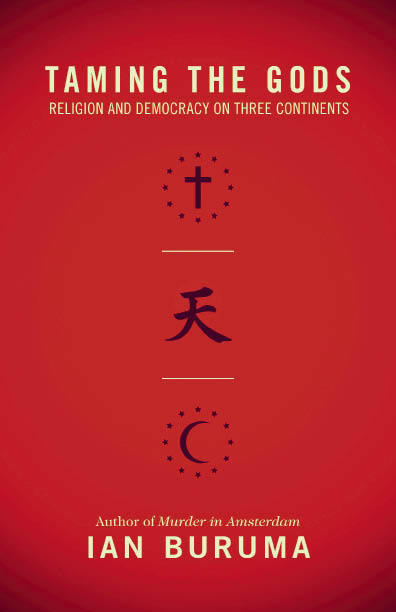Taming the Gods is an extended essay about the secular state, something which would until recently have been regarded as a non-issue by English-speaking readers. The separation of Church and State is taken so much for granted in the West, that one can easily forget how recent and local its origins are. Religious beliefs, wrote Edward Gibbon, are ‘considered by the people as equally true; by the philosopher as equally false; and by the magistrate as equally useful’.
As usual, Gibbon was fathering on the Romans the instincts of enlightened Englishmen of his own day. For the secular state was born in 18th-century England, and adopted by Revolutionary France. It marked the reaction of educated elites in both countries against the murderous religious wars of the 16th and 17th centuries, and the oppressive political power of the established Christian churches in most of the major European states. From England and France, it was spread across Europe by the Napoleonic conquests and across much of the rest of the world by European colonists.
Yet for most of human history, the idea that religious belief and practice belonged exclusively to the domain of private life would have been dismissed as absurd. Divine endorsement was the indispensable source of political legitimacy. Organised religion was regarded as an essential part of the life of the state. It seemed axiomatic that religious belief was the only possible foundation for any durable moral standards. All of these beliefs have been jettisoned in Europe and most of them in the United States as well. But they are back on the agenda with a vengeance now, because of the growing significance of Islam, with its root-and-branch rejection of the secular state and God-free morality.
For Ian Buruma, the question which these developments pose is far more fundamental than the social dilemmas traditionally associated with large-scale immigration. The great 19th-century thinker Alexis de Tocqueville thought that democracy was possible in the United States because Americans shared a common system of values based on Protestant Christianity, while at the same time rejecting any pretensions that the churches might have to exercise political authority. In retrospect, we can see that this was too narrow a view. Democracy in America has survived successive tides of immigration which have swamped its Protestant and largely Anglo-Saxon origins, and made it a far more diverse country than it was in De Tocqueville’s day. So far, the same has been true of western Europe. But can democracy survive for long in the face of a significant group which not only rejects the agnostic and hedonistic culture around it, but declines to distinguish between the domains of private morality and public authority?
Buruma thinks so. He has no time for the apocalyptic prophecies of other US-based commentators about Europe. He is a persistent optimist. His reasons owe much to the French writer, Olivier Roy, whose influence he readily acknowledges. Like Roy, Buruma does not accept that there is any organic connection between ‘Islamic’ terrorism and Islam. In his eyes, the second-generation immigrants who have been responsible for the main terrorist outrages have only limited familiarity with Islam. The real problem is the alienation of European-educated young men from the village culture of their parents, as well as from a host community which has never really accepted them as its own. They are radicals first, Muslims after, he argues, and not particularly good Muslims at that. Writing of Mohammed Bouyeri, the murderer of the Dutch film-maker, Theo van Gogh, Buruma remarks:
If he had been a Russian in the early 20th century, he might have been an anarchist. If he had been German in the 1970s, he could easily have joined the Red Army Faction. Since he was a ‘Moroccan’ in 21st-century Holland, he was born again as a holy warrior for an Islamic utopia.
Not everyone will agree with this analysis. Islamic radicalism may have particular attractions for rootless young Europeans of Moroccan or Pakistani descent, but it is still worth asking why. Alienation and the loss of identity are no doubt part of it. But there is more at stake than the personal whims of zealous and immature neo-anarchists. There is a body of Islamic teaching, some of it ancient and unimpeachably orthodox, to justify their violence. There is some institutional framework to support it. The radical preachers working in some British mosques, the terrorist training facilities in Pakistan, are no doubt marginal to the generally pacific mainstream of European Islam. But their activities belong to a strand of Islamic thinking which has always existed and has become more influential. Why else should young men, however deracinated, choose to associate themselves with it? The early 20th- century anarchists and the Red Army Faction, after all, had no need of any religious message to give them a sense of identity.
Yet Buruma’s optimism is surely justified, even if his reasons do not always convince. Most religions, including Christianity and Judaism, have a messianic or utopian streak which is capable of being directed to violent ends and sometimes has been. Nevertheless, religious violence is not the normal pattern of the life of Christians and Jews. Bodies of religious teaching are not intellectually monolithic. Even the most devout have a way of disregarding the more disruptive bits. Are Moslems any different? Probably not, in spite of the more blood-curdling hadiths. Britain and France have long traditions of inward migration, and the absorptive power of their societies is very great. But even if we reject Ian Buruma’s optimism, we would do well to ask ourselves the kind of fundamental questions posed by his erudite and thought-provoking book.






Comments